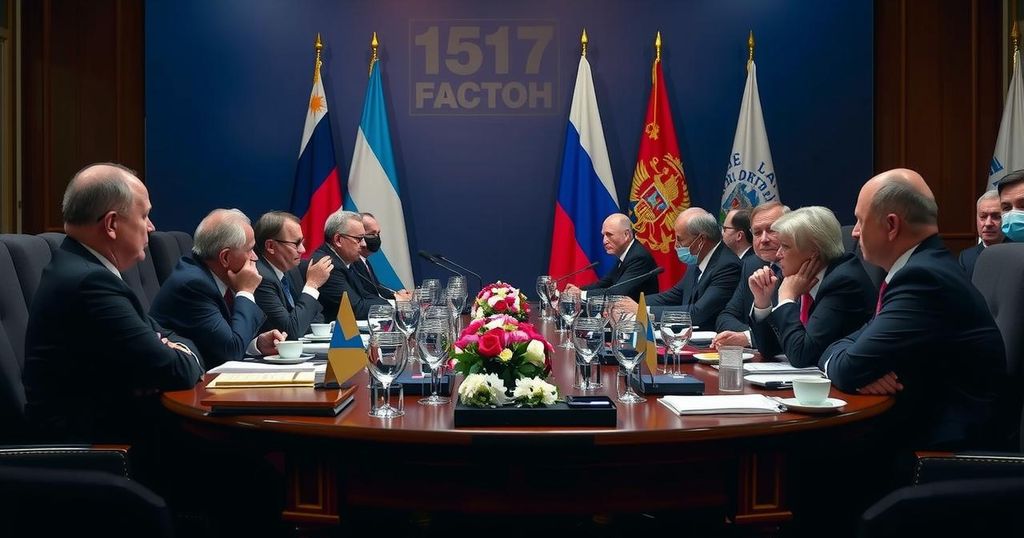BRICS Leaders Back Putin at Summit Amid Ukraine Conflict
Indian Prime Minister Narendra Modi and Chinese President Xi Jinping expressed support for Russia during the BRICS summit in Kazan, with calls for resolving the Ukraine conflict peacefully. The summit emphasizes Russia’s efforts to assert its global presence and alliances, despite Western sanctions. Discussions will include a proposed BRICS payment system and other geopolitical concerns, amidst rising tensions and security measures in the region.
In Kazan, Russia, Indian Prime Minister Narendra Modi urged for a swift resolution to the conflict in Ukraine during a meeting with President Vladimir Putin on Tuesday. As part of the gathering of BRICS leaders, which Putin is hosting, Chinese President Xi Jinping emphasized the deepening ties between Beijing and Moscow, particularly in the context of a turbulent global landscape. Modi expressed India’s commitment to peaceful negotiations, declaring, “We believe that disputes should only be resolved peacefully. We totally support efforts to quickly restore peace and stability.” Meanwhile, Xi labeled the relationship between China and Russia as a “profound friendship” that has bolstered both nations’ development strategies. In this complex geopolitical scenario, India has strived to maintain a balanced approach, providing humanitarian aid to Ukraine while refraining from direct condemnation of Russia. Modi’s recent diplomatic visits to Kyiv and Moscow underline India’s role as a potential mediator. South African President Cyril Ramaphosa also recognized Russia as a “valued ally,” reflecting historical ties dating back to the struggle against apartheid. The BRICS summit, marked by heightened security measures, aims to demonstrate that Russia has not been isolated from the global community, despite Western sanctions and diplomatic pressures. A range of topics, including the proposal for a BRICS-led payment system and the Middle Eastern tensions, will be discussed. The Kremlin seeks to portray itself as a pivotal player in a multipolar world, countering claims from the United States that BRICS lacks geopolitical significance. On the eve of the summit, reports indicated increased security in Kazan due to the threat of drone attacks from Ukraine, leading to restricted movement for residents and heightened police presence. The BRICS group, initially formed with four members, has expanded to incorporate additional nations, though internal divisions remain, particularly between India and China. Additionally, Brazilian President Luiz Inacio Lula da Silva’s last-minute cancellation due to health issues has added to the summit’s challenges. The Kremlin aims to showcase its ongoing influence and alliances despite facing international scrutiny, particularly in light of the International Criminal Court’s arrest warrant for President Putin. This strategic gathering reflects Russia’s desire to reinforce its global position amidst ongoing conflict and diplomatic isolation.
The BRICS summit, which includes leaders from Brazil, Russia, India, China, and South Africa, represents a coalition of emerging economies seeking to reform international financial and political systems. Established in 2009, BRICS has evolved to include various countries, with each member bringing its own geopolitical interests and challenges. Current tensions around the Ukraine conflict have prompted discussions about global alliances, particularly regarding the impact of Western sanctions on Russia. The summit in Kazan serves as a crucial moment for Russia to assert its presence on the world stage and foster partnerships that may counterbalance Western influence.
The BRICS summit in Kazan highlighted a strategic effort by Russia to strengthen ties with emerging nations amidst global tensions, particularly surrounding the Ukraine conflict. Leaders from India and South Africa expressed support for Russia, framing their relationships as historically significant. Amidst security concerns and internal divisions within BRICS, the summit aimed to project a sense of unity among members and challenge the narrative of Russian isolation. Ultimately, the meeting underscores the complexities of global diplomacy as nations navigate their interests in a multipolar world.
Original Source: www.courthousenews.com




Post Comment